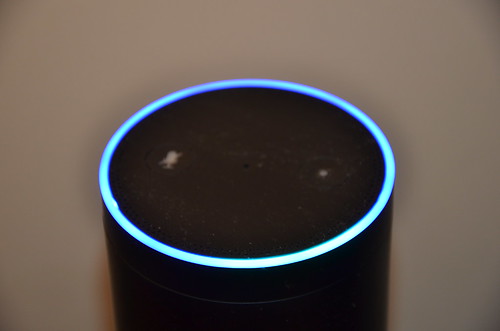 For Christmas, I got myself an Amazon Echo Dot (and I wasn’t the only one). For me, it’s been a fun and more convenient way to play music in our living room area, and I’ve been listening to more music as a result. I also had the idea that it would be nice to build some speech-driven interfaces to things.
For Christmas, I got myself an Amazon Echo Dot (and I wasn’t the only one). For me, it’s been a fun and more convenient way to play music in our living room area, and I’ve been listening to more music as a result. I also had the idea that it would be nice to build some speech-driven interfaces to things.
It has been over a decade since I did speech recognition work. Speech recognition was used in one of the early projects that I did after I first left Uni, where I was part of a team that built a speech-driven personal assistant. It was a little ahead of its time, and never went anywhere.
Still, I thought I could put those slighty-rusty skills to use on the Echo, since Amazon provides a way to create Alexa skills (the name given to apps that run on the Echo behind the scenes). My idea was to use the Echo to provide a way to help the kids with maths, since they love to talk to “Alexa”.
Last week, my skill was published on Amazon’s list of Alexa skills. It allows someone to say “Alexa, tell me now if 1 plus 1 equals 2”, and will respond by saying that they’ve gotten this correct (or not). Unlike the basic Alexa functionality of doing maths, where someone might say “Alexa, what is 1 plus 1”, this skill forces the speaker to offer the answer and have it checked. This should be useful to anyone wanting to test their maths, and it supports addition, subtraction and multiplication. Basic users would probably use small numbers, but advanced users can use large numbers – the skill supports it all. Not negative numbers or zero, though!
Doing the coding behind this was straightforward; it was some simple Node.js code that runs on AWS Lambda. What was less straightforward was sorting out the grammar to use.
In speech recognition, the word “grammar” refers to the set of different phrases that an application can recognise at a point in time. A simple grammar is one that consists of just the phrases “yes” and “no”. A complex grammar might include every product for sale on Amazon itself and different ways to order them. The grammar is used by the speech recognition engine to improve its recognition, since it doesn’t need to always listen for every possible word in English, but only the specific words that are contained in the grammar.
To develop an Alexa skill, you need to hack together the basic Alexa grammar, together with an “invocation name”, and then the grammar that the skill itself can recognise. (Here, I’m using the word hack in its art-of-programming sense, not in the computer-intrusion sense.) Usually, the invocation name is a pronoun, e.g. “Dog Facts”, “Starbucks” or “GE Podcast Theatre”. However, it can be any set of words, and there is alternative dog fact skill that uses the invocation name “me a dog fact”.
This last one doesn’t seem to make sense until you remember that there is a grammar that comes before the invocation name. It starts with a “wake word” (one of “Alexa”, “Amazon” or “Echo”), then a variety of commands based around words like “tell”, “ask”, “start” or “open”. So, the invocation name gets added to this grammar, e.g. “Alexa, tell” + “me a dog fact” which makes a lot more sense.
Amazon publishes a list of constraints relating to invocation names. For my application, it would have been easiest to develop it using an invocation name like “Math Test” and then users would interact with it like “Alexa, ask Math Test to check if 1 plus 1 equals 2”. However, I wanted to see if I could do something that was easier for users.
Initially, I tried out the invocation name “me if”, which would produce nice interactions like “Alexa, tell me if 1 plus 1 equals 2”. However, using “if” violates one of Amazon’s constraints around invocation names, so I needed to find something else. That’s how I ended up with “me now” as my invocation name. Interactions become slightly longer, but still workable, like “Alexa, tell me now if 1 plus 1 equals 2”. To make this approach obvious to users, the skill is named “Tell Me Now”.
Now, I just need to get the kids to speak to Alexa about maths instead of music.